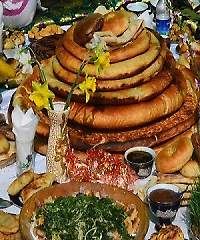Nowruz celebrates in Central Asia today
 Bishkek, Kyrgyzstan: Nowruz is being celebrated in Central Asia today.
Bishkek, Kyrgyzstan: Nowruz is being celebrated in Central Asia today.
Nowruz is the first day of new year in Central Asia and Eastern Europe as well as in Turkey, Afghanistan, Iran, Azerbaijan celebrate Nowruz with cooking food, wearing new cloths, meeting friends and cleaning every corner of the house. People celebrate Nowruz for 13 days starting from March 21.
Nowruz is also called as Noruz, Nowruz, Nowrooz, and Nawruz, meaning “New Day,” because it marks the first day of the Persian “New Year” and Spring in many Eastern European countries.
Legends say that Persian kings used to wear crown with images of the annual solar cycle on their heads and distributed gifts among people.
The sun enters the sign of Aries on the astrological calendar and the number of daylight hours are equals the number of nighttime hours on March 21 in Central Asia.
Nowruz traditions survived strongly in Central Asia despite of 70 year old Soviet rule and the Central Asian republics have recognized Nowruz as an official holiday. Major attractions of Nowruz are cooking traditional foods, wearing new cloths, concerts in parks and squares, trade fairs and family meetings.
“Celebrations of spring are a natural outgrowth of the Earth’s rhythms. In most of the Silk Road countries, Nowruz announces the joyful awakening of nature after winter and the beginning of the agricultural cycle of cultivating, planting, and harvesting”, indicated an old Persian book.
People plant new trees, mostly fruit trees during next 13 days in villages as well as in cities.
The activities of the first 13 days of the New Year are considered harbingers of the year to come. For this reason, it is traditional to end quarrels, forgive debts, and overlook enmity and insults. It is a time for reconciliation, when forgiveness and cheerfulness are the dominant sentiments.
The most popular cooking dish of Nowruz in Central Asia is “Sumalyak” that is made from flour and sprouted wheat grains. Sumalyak is cooked slowly on a wood fire, sometimes with the addition of spices. Sprouted grain is a symbol of life, heat, abundance, and health.
People also fumigate their homes with smoke from the burning of coniferous tree leafs and this smoke is said to make malicious spirits flee.
